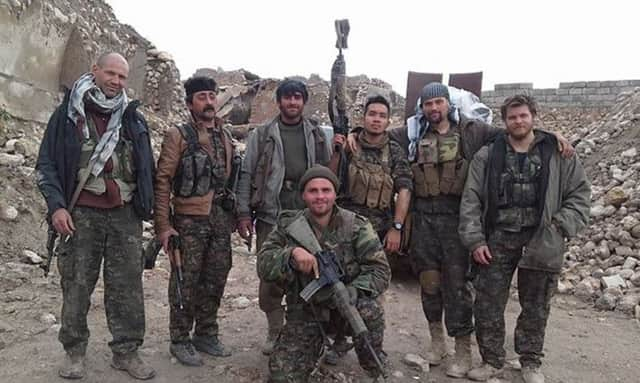Former Royal Marine dies fighting IS in Syria


Konstandinos Erik Scurfield, from Barnsley, South Yorkshire, was named by the Kurdish People’s Protection Units (YPG).
A picture emerged that appeared to show Mr Scurfield wearing military fatigues and holding an assault rifle with several foreign fighters and Kurds.
Advertisement
Hide AdAdvertisement
Hide AdA statement on the Kurdish Question website read: “We can confirm that Konstandinos Erik Scurfield died in battle, probably in Hasakah although the full details are yet to be announced by YPG.”
Vicci Scurfield, the ex-Royal Marine’s mother, said the family, who live in a detached former farmhouse in the village of Royston, was “reeling”.
She said: “We’re waiting to hear from the police and the Foreign Office, trying to get our heads round everything.”
Mark Campbell, a pro-Kurdish rights campaigner, said he broke the news to Mr Scurfield’s mother. He said: “It was just awful, to be honest. Just to receive a phone call with that sort of news was just devastating.
“It was so incredibly difficult. It was very, very emotional – she was literally in tears the whole conversation.
“I really just wanted to inform her, to give her a message from the YPG that they have said they would love to bury Konstandinos as one of their comrades in arms, as a hero, but equally they also want to be guided by the family and will respect the wishes of the family.”
Mr Campbell said Mr Scurfield’s death also had a great impact on his friends and colleagues.
He said: “I’ve got a message from [fellow fighter] Jordan Matson saying that he is lying with his [Mr Scurfield’s] body.
Advertisement
Hide AdAdvertisement
Hide Ad“I think he’s been incredibly affected by his death as well – I think he was one of his closest friends.”
Mr Matson, believed to be a former US soldier fighting with the Kurds, paid tribute on Facebook to Mr Scurfield, describing him as a “disciplined warrior”.
He posted: “Words cannot describe how honoured I have been to fight at your side Sehid Kemal (Konstandions Erik Scurfield).
“We were together from his first day here and you couldn’t ask for a more disciplined warrior.
“Kosta, as we call him, was from the United Kingdom and was born a Greek citizen. He served both in the Greek army and as a British Royal Marine commando up until he came here. He served with me in Jezza and Shengal.
“Kosta volunteered for every attack and guard duty opportunity. He wanted nothing more than to bring the fight to the enemy. I’m going to carry on your legacy, brother, I will never forget you. I love you, man. Save me a place up there, big guy.”
Dan Jarvis, MP for Barnsley Central, said he understood Mr Scurfield travelled to Syria to provide humanitarian assistance. British authorities have not yet given him formal confirmation that Mr Scurfield, who was with 45 Commando based in Arbroath, has been killed.
Mr Jarvis said: “My understanding is that he had very significant ideological concerns about what is happening, about the actions Islamic State were taking in the region, and he wanted to make a contribution. My understanding is that he went there to make a humanitarian contribution, he didn’t go there to fight. He provided medical assistance.
Advertisement
Hide AdAdvertisement
Hide Ad“In terms of precisely what’s happened, we don’t know yet, but my understanding was that he went there for honourable reasons.
“But I repeat, the Foreign Office have been incredibly clear in the travel advice that they’ve issued, that people should not travel to the region.
“There are other ways in which people who have these legitimate concerns can make a contribution – supporting charities or NGOs. The advice is rightly not to go there.”
While high numbers of foreigners are known to have joined IS, around 100 westerners – including several Britons – are thought to have fought alongside the Kurds.
Last month, a 19-year-old serving British soldier was returned to his unit after joining the Kurdish peshmerga.
It was reported he left his base after telling his family he was joining the Kurds in their battle against IS because “these guys need our help”.
Ex-soldiers drawn to Kurdish militia’s fight in northern Syria
Former Royal Marine Konstandinos Erik Scurfield was one of a number of people who joined Kurdish fighters battling the Islamic State (IS) in Syria.
Advertisement
Hide AdAdvertisement
Hide AdMr Scurfield is understood to have travelled there three or four months ago and died fighting IS militants in the north of the country.
Large numbers of foreign fighters are known to have joined IS, but in recent months an increasing number of westerners are thought to have pledged to fight alongside the Kurdish People’s Protection Units (YPG), the main Kurdish militia fighting in northern Syria.
The so-called Lions Of Rojava group, aligned to the YPG, claims it has recruited dozens of westerners in recent months – former soldiers from countries including the UK, the US, Germany, Sweden, Canada and the Netherlands. At least one other foreign fighter, Australian Ase Johnson, is understood to have been killed fighting alongside the Kurds.
In November it emerged ex-British soldiers Jamie Read, 24, from Cumbria, and James Hughes, 26, from Worcestershire, travelled to Syria to fight after feeling “compelled” to take up arms following the murder of British aid volunteer Alan Henning.
Dr Afzal Ashraf, an expert in counter-terrorism at the Royal United Services Institute, said up to 50 UK people may have gone to Syria to fight against IS and president Assad’s regime. He said: “There are really two lots of people travelling out to Syria. People go to fight for IS, the so-called Islamic State, and that figure is between 300 and 500 people from the UK.”
FOLLOW US
SCOTSMAN TABLET AND MOBILE APPS